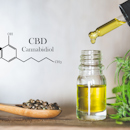
What Nurses Need To Know About Cannabidiol (Epidiolex®)
The US Food and Drug Administration (FDA) recently approved Epidiolex oral solution, the first FDA-approved drug to contain cannabidiol (CBD) extracted from the cannabis plant. The drug is approved for the treatment of seizures associated with Lennox-Gastaut syndrome (LGS) or Dravet syndrome (DS) in patients ≥2 years of age. (Lexi-Comp 2018, FDA 2018). LGS and DS are common forms of treatment-resistant epilepsy (TRE) that develop in children. Current therapies include antiepileptic drugs (AED), often used in multidrug regimen and sometimes off-label, but provide limit control of seizures. (O’Connell, et al., 2017) The long term consequences of TRE often include cognitive, behavioral, and motor delays, especially in TREs that develop early in life. Because of this, early seizure control is can result in better clinical outcomes.
The FDA approval of Epidiolex in the treatment of Lennox-Gastaut Syndrome (LGS) related seizures was based on two randomized, double-blind- placebo-controlled trials. (Thiele, et al., 2018, Devinsky, et al, 2018), Both studies required patients ages 2 to 55 years to have a diagnosis of LGS, inadequate control of seizures with at least one AED, and a minimum of 8 drop seizures within a 4-week baseline period. Both studies looked at the percent change in frequency of drop seizures per 28 days from baseline. The first study included 171 patients and compared Epidiolex 20 mg/kg/day with placebo over a 2-week titration period and a 12-week maintenance period. (Thiele, et al, 2018) Patients receiving Epidiolex saw a 41% median percentage reduction compared to 14% in the placebo group. The second study included 225 patients and compared Epidiolex 10 mg/kg/day and 20 mg/kg/day with placebo over a 2-week titration period and a 12-week maintenance period. (Devinsky, et al., 2018). Patients receiving Epidiolex 10 mg/kg/day saw a 36% median percentage reduction and patients receiving Epidiolex 20 mg/kg/day saw a 38% median percentage reduction compared to 18% in the placebo group.
The FDA approval of Epidiolex in the treatment of Dravet Syndrome (DS) related seizures was based on a single randomized, double-blind, placebo-controlled trial. (Devinsky, et al., 2017). This study required patients ages 2 to 18 years to have a diagnosis with treatment-resistant DS, inadequate control with at least once AED, and a minimum of 4 convulsive seizures within a 4-week baseline period. This study included 120 patients and compared Epidiolex 20 mg/kg/day with placebo over a 2-week titration period and a 12-week maintenance period. This study also looked at the percent change in frequency of drop seizures per 28 days from baseline. Patients receiving Epidiolex 20 mg/kg/day saw a 39% median percentage reduction in seizures compared to 13% in the placebo group.
Epidiolex is available as a 100 mg/mL oral solution. Initiating treatment requires titration, with the maximum dose being 20 mg/kg/day. The preparation may be administered with or without food, as long as it is administered consistently. Side effects include somnolence, fatigue, malaise, decreased appetite, diarrhea, insomnia, and transaminase elevations. More severe, but rare adverse reactions include hepatocellular injury, suicidal behavior and ideation, hypersensitivity reactions, and mild withdrawal syndrome. The therapeutic effects of cannabidiol for conditions other than epilepsy have not been fully elucidated. The exact mechanism of action of cannabidiol in epilepsy is unknown; however, it does not appear to involve its effects on cannabinoid receptors. (Lexi-Comp, 2018). Recently, the Department of Justice and Drug Enforcement Administration placed cannabidiol in schedule V of the Controlled Substances Act. (FDA, 2018)
References
Lexicomp [Internet]. Hudson (OH): Wolters Kluwer Clinical Drug Information. 2018 [cited 2018 Dec 15].
Food and Drug Administration. FDA-approved drug Epidiolex placed in schedule V of Controlled Substance Act. (2018, September 27).
O’Connell, B. K., Gloss, D., & Devinsky, O. (2017). Cannabinoids in treatment-resistant epilepsy: A review. Epilepsy & Behavior, 70, 341-348. doi:10.1016/j.yebeh.2016.11.012
Thiele, E. A., Marsh, E. D., French, J. A., Mazurkiewicz-Beldzinska, M., Benbadis, S. R., Joshi, C., et al. (2018). Cannabidiol in patients with seizures associated with Lennox-Gastaut syndrome (GWPCARE4): A randomised, double-blind, placebo-controlled phase 3 trial. The Lancet, 391(10125), 1085-1096. doi:10.1016/s0140-6736(18)30136-3
Devinsky, O., Patel, A. D., Cross, J. H., Villanueva, V., Wirrell, E. C., Privitera, M., et al. (2018). Effect of Cannabidiol on Drop Seizures in the Lennox–Gastaut Syndrome. New England Journal of Medicine, 378(20), 1888-1897. doi:10.1056/nejmoa1714631 Devinsky, O., Cross J.H., Laux L., Marsh E., Miller I., Nabbout R., et al. Trial of Cannabidiol for Drug-Resistant Seizures in the Dravet Syndrome. (2017). New England Journal of Medicine, 377(7), 699-700. doi:10.1056/nejmc1708349
Food and Drug Administration. Epidiolex (cannabidiol) oral solution [package insert]. Carlsbad, CA: Greenwich Biosciences, Inc; 2018 Jun. [cited 2018 Dec 15]




